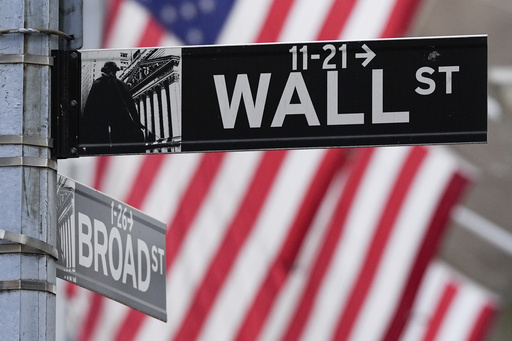
NEW YORK – On Wednesday, U.S. stock markets faced a decline after new data indicated a surprising rise in inflation impacting American consumers.
The S&P 500 index slipped by 0.3%, recovering from an earlier dip of 1.1% when trading commenced. The Dow Jones Industrial Average experienced a loss of 225 points, equivalent to 0.5%, while the Nasdaq composite saw a slight increase of less than 0.1%.
Throughout the trading day, stocks minimized their losses as oil prices softened. The cost for a barrel of benchmark U.S. crude decreased by 2.7%, falling below $72, following President Donald Trump’s announcement about entering “negotiations” with Russia’s president regarding the resolution of the war in Ukraine, a development that may facilitate the global flow of crude oil.
Despite this decrease in oil prices, the overarching trend on Wall Street remained bearish, with most stocks experiencing a downturn. In the bond market, Treasury yields stayed significantly high, adding stress to the financial markets after the morning report revealed that U.S. consumers faced steeper prices for essentials such as eggs and gasoline than analysts had predicted.
In January, overall inflation for U.S. consumers climbed to 3%, surpassing the 2.9% rate recorded in December, which was the expected figure by economists.
This inflation data highlighted the increasing pressure on the budgets of American households. Furthermore, Wall Street traders seemed correct in anticipating that the Federal Reserve would provide reduced relief for consumers through potential interest rate cuts this year.
The Federal Reserve had previously made substantial cuts to its main interest rates from September until the end of last year with the aim of making borrowing more accessible, stimulating the economy, and supporting higher prices for various investments. However, Fed officials cautioned towards the end of 2024 that they may not decrease rates as significantly in 2025, primarily due to ongoing concerns over sustained high inflation. The goal remains to maintain inflation at a target rate of 2%, but lower interest rates could inadvertently exacerbate inflation.
Some investors were already speculating that the Fed might refrain from implementing any rate cuts in 2025, even prior to the consumer price index (CPI) report released on Wednesday.
“The unexpectedly high CPI signifies ongoing investor concerns about persistently high inflation that may keep the Fed inactive,” commented Sameer Samana, head of global equities and real assets at Wells Fargo Investment Institute.
Moreover, the January inflation figures do not account for any tariffs recently announced by Trump, which may lead to inflated import prices down the line. Samana indicated that the effects of these tariffs would become noticeable later in the year.
In light of the unfavorable inflation update from January, traders are now estimating a 29% probability that the Fed will opt not to cut interest rates at all for the remainder of this year, a notable rise from the previous estimation of below 20%.
Such market expectations drove the yield on the 10-year Treasury up to 4.62%, up from 4.54% recorded the previous day—an important shift in the bond market.
When a 10-year Treasury bond, recognized as one of the safest investments available, offers this level of interest, it tends to make stocks appear less appealing to investors, thereby applying downward pressure on U.S. stock prices. Critics argue that U.S. stock values seem already inflated following a year of record highs, with the most recent peak for the S&P 500 occurring the previous month.
One potential avenue for companies to mitigate stock price declines is by achieving stronger earnings.
Gilead Sciences managed this feat, with its stock climbing by 7.5% after exceeding profit expectations for its latest quarter, mainly due to robust performance in its HIV products.
Meanwhile, CVS Health surged by 14.9% after surpassing Wall Street’s predictions in both revenue and profit for the latest quarter.
Conversely, exceeding profit expectations does not guarantee success for all firms; for instance, ride-hailing company Lyft saw its stock drop by 7.9% despite posting better-than-expected earnings, as its revenue for the final quarter of 2024 fell marginally short of analysts’ predictions.
Homebuilders and firms sensitive to ongoing high mortgage rates brought additional strain to the market. Home Depot’s stock decreased by 2.2%, Builders FirstSource’s dropped by 3.5%, and Lennar’s declined by 2.7%.
Exxon Mobil saw a 3% drop, paralleling the decline in oil and gas shares after Brent crude, the global benchmark, fell by 2.4% to $75.18 per barrel.
Additionally, Frontier Group Holdings—parent company of Frontier Airlines—witnessed a 4.9% loss after Spirit Airlines dismissed a third acquisition proposal from the low-cost airline, stating it would prioritize its strategy to exit U.S. bankruptcy proceedings and stabilize its finances.
Ultimately, the S&P 500 decreased by 16.53 points, concluding at 6,051.97, while the Dow Jones Industrial Average fell by 225.09 points to end at 44,368.56. The Nasdaq composite showed a slight gain, rising 6.09 points to 19,649.95.
Internationally, stock markets showed mostly positive performance across Europe and Asia.

